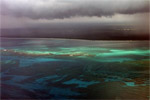After denying protection to polar bears, sharks, and the Critically Endangered Atlantic bluefin tuna, the Convention on International Trade in Endangered Species (CITES) has today voted against additional protections for harvested coral species, according to TRAFFIC, a wildlife trade monitoring group. The joint US and EU measure would have put in place scientific and trade monitoring of over thirty species of red and pink coral in the Mediterranean and western Pacific.
The corals are harvested to make jewelry. But harvests of the coral have seen a significant decline: over 85 percent in thirty years. Marine conservations warn that the corals are too slow-growing to sustain such heavy collecting, since they require a hundred years to reach maturity.
Japan, which also led the movement to reject the ban on the Atlantic bluefin tuna trade, lobbied others to vote ‘no’ against the monitoring. The country argued that deep water corals are not facing extinction and that monitoring would impact poor coastal fishing communities, especially in North African nations. The vote was done secretly.
“TRAFFIC and WWF are deeply disappointed with the decision not to list red and pink corals,” said Ernie Cooper of TRAFFIC Canada. “Without the trade control measures this would have introduced, the current overharvesting of these precious corals will continue unabated.”
It is estimated that 30 to 50 metric tons of the corals are harvested every year. The United States is the world’s largest purchaser of coral jewelry.
Related articles
Critically Endangered bluefin tuna receives no reprieve from CITES
(03/18/2010) A proposal to totally ban the trade in the Critically Endangered Atlantic bluefin tuna failed at the Convention on International Trade in Endangered Species (CITES), surprising many who saw positive signs leading up to the meeting of a successful ban.
(03/17/2010) An effort to bolster conservation measures for plummeting shark populations was defeated yesterday at the Convention on International Trade in Endangered Species (CITES), according to the AP. The nonbinding measure would have increased transparency in the shark trade and produced research on illegal fishing for sharks.
Healthy coral reefs produce clouds and precipitation

(03/03/2010) Twenty years of research has led Dr. Graham Jones of Australia’s Southern Cross University to discover a startling connection between coral reefs and coastal precipitation. According to Jones, a substance produced by thriving coral reefs seed clouds leading to precipitation in a long-standing natural process that is coming under threat due to climate change.







